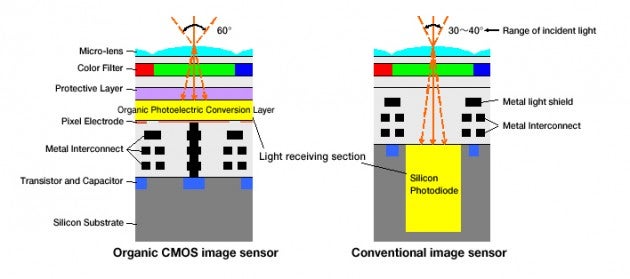Fujifilm and Panasonic have announced the development of organic CMOS image sensor technology that's claimed to expand dynamic range and enhance sensitivity performance
Fujifilm and Panasonic have announced the development of organic CMOS image sensor technology that uses an organic photoelectric conversion layer with a photoelectric conversion property at the light receiving section of an image sensor to achieve a performance beyond that of conventional image sensors.
Applying this technology to the image sensors of digital cameras and other imaging devices is claimed to expand dynamic range and enhance sensitivity further to prevent highlight clipping in bright scenes and capture a dark subject with vivid colors and rich textures.
The industry has put into continuous efforts to explore image sensor technologies for increasing their number of pixels. This has dramatically improved sensor resolutions, but, in order to further boost image quality, it is necessary to expand the dynamic range, enhance sensitivity and prevent cross-talk or color mixing between pixels.
Panasonic took advantage of its semiconductor device technology to boost image quality for its high-performance image sensors. Fujifilm, on the other hand, has developed highly-reliable organic photoelectric conversion layer with high absorption coefficient to be used on a sensor’s light receiving section instead of silicon photodiode in an effort to build a new image sensor technology.
In this latest collaboration, Fujifilm and Panasonic have combined Fujifilm’s organic photoelectric conversion layer technology with Panasonic’s semiconductor device technology to jointly develop an organic CMOS image sensor that outperforms conventional image sensors.
The new organic CMOS image sensor is claimed to offer the industry’s highest dynamic range of 88dB, advanced sensitivity 1.2 times more sensitive than conventional sensors and broader range of incident angle to enable the production of more sensitive and compact cameras with better image quality. The two companies are expected to promote the application of this organic CMOS image sensor technology to a wide range of products including security cameras, in-vehicle cameras, mobile devices as well as digital cameras.
Fujifilm and Panasonic will present the research results at the 2013 Symposium on VLSI Technology (VLSI2013) to be held in Kyoto on June 11, and the 2013 International Image Sensor Workshop to be held in Utah, U.S.A. on June 15.
A full overview of the newly-developed organic CMOS image sensor technology can be found by visiting http://www.fujifilm.com/news/n130611.html





